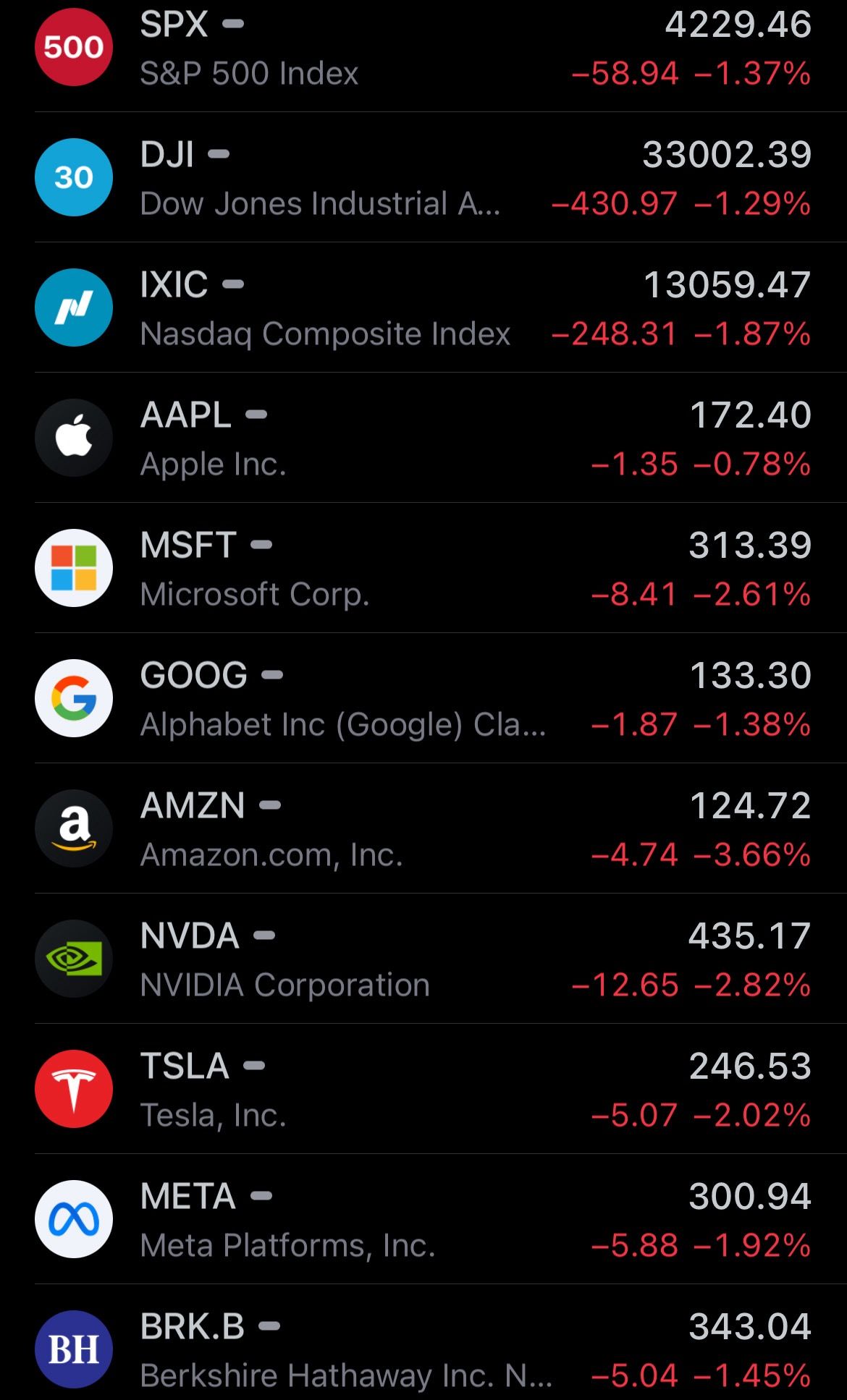Wednesday☕️

Trending:
- U.S. House Speaker
- Sam Bankman-Fried Trial
- Intel's Semiconductor Business
Markets:
- Yesterday's U.S. stock market:

- Yesterday's commodity market:

- Yesterday's crypto market:

U.S. House Speaker:
- The U.S. House made an unprecedented move by voting out its highest-ranking official, Speaker Kevin McCarthy from California. This marks the first instance in U.S. history where a sitting speaker was removed. The action was initiated by a faction of representatives led by Florida's Matt Gaetz.
- The group pushed for significant spending reductions, bolstered border security, and reduced aid to Ukraine. However, negotiations reached an impasse, resulting in McCarthy and the Democrats agreeing to maintain 2023 spending levels until mid-November. Gaetz then initiated a "motion to vacate," and with a close vote of 216 to 210, McCarthy was voted out of his speaker position.
Sam Bankman-Fried Fraud Case:
- The trial of Sam Bankman-Fried has begun. Previously a billionaire, Bankman-Fried faces significant prison time due to allegations of one of the largest financial frauds in U.S. history. He used to lead one of the top cryptocurrency exchanges (FTX) and is accused of defrauding billions from stakeholders.
- SBF has pleaded not guilty and denies these allegations. Bankman-Fried's rise to prominence came after founding FTX, a crypto exchange, in 2019. However, his reputation took a hit when FTX declared bankruptcy and over $8 billion was reportedly missing. His trial, expected to last six weeks, has garnered significant media attention.
- According to the Department of Justice, Bankman-Fried misused FTX customer funds for personal expenses and hid the financial connections between FTX and his trading firm, Alameda Research. While he acknowledges administrative errors, he refutes deliberate misconduct. Key associates, including his former girlfriend and ex-chief of Alameda, Caroline Ellison, have already pleaded guilty, with some expected to testify against him.
Intel's Semiconductor Business:
- Intel's CEO, Pat Gelsinger, has initiated the spin-off of its programmable chip division as part of a larger company restructuring effort. These reprogrammable chips, will operate as a separate entity starting January 1, with plans for an initial public offering in the next two to three years.
- The move aims to focus on Intel's main business while allowing the division to grow independently. Intel's programmable chips, designed to be reconfigured even after manufacturing, are widely used in the defense and telecommunications sectors. These specialized chips offer versatility by allowing users to tailor their functionalities to specific applications.
- Their adaptability makes them invaluable in rapidly evolving industries, enabling timely updates and customizations without the need for entirely new hardware. This programmable chip division, acquired from Altera in 2015 for $16.7 billion, had a revenue of $484 million in the last quarter of 2021, making up 2.4% of Intel's total sales.
- As leadership transitions occur, Sandra Rivera will oversee the unit as CEO, targeting growth in industries like automotive and aerospace. Gelsinger's broader strategy for Intel involves heavy investment in manufacturing, aiming to match the performance of other competitors. To manage costs, Intel is looking to cut up to $10 billion by 2025 and has entered into various partnerships to fund new facilities.
Statistics:
- Top 50 semiconductor companies by market cap:
- 🇺🇸 NVIDIA: $1.074T
- 🇹🇼 TSMC: $442.97B
- 🇺🇸 Broadcom: $336.30B
- 🇰🇷 Samsung: $333.42B
- 🇳🇱 ASML: $224.47B
- 🇺🇸 AMD: $161.69B
- 🇺🇸 Intel: $149.46B
- 🇺🇸 Texas Instruments: $142.77B
- 🇺🇸 QUALCOMM: $122.97B
- 🇺🇸 Applied Materials: $114.37B
- 🇺🇸 Analog Devices: $85.46B
- 🇺🇸 Lam Research: $81.72B
- 🇺🇸 Micron Technology: $74.29B
- 🇺🇸 Synopsys: $68.54B
- 🇯🇵 Tokyo Electron: $61.90B
- 🇺🇸 KLA: $61.59B
- 🇰🇷 SK Hynix: $59.76B
- 🇬🇧 Arm Holdings: $52.91B
- 🇳🇱 NXP Semiconductors: $50.32B
- 🇺🇸 Marvell Technology Group: $45.34B
- 🇩🇪 Infineon: $42.55B
- 🇺🇸 Microchip Technology: $41.77B
- 🇺🇸 ON Semiconductor: $38.73B
- 🇨🇭 STMicroelectronics: $38.05B
- 🇹🇼 MediaTek: $38.01B
- 🇺🇸 GlobalFoundries: $30.98B
- 🇨🇳 SMIC: $28.60B
- 🇯🇵 Renesas Electronics: $26.86B
- 🇺🇸 Monolithic Power Systems: $21.44B
- 🇯🇵 Advantest: $20.88B
- 🇯🇵 Disco Corp.: $20.35B
- 🇳🇱 ASM International: $20.15B
- 🇹🇼 United Microelectronics: $17.34B
- 🇹🇼 ASE Group: $15.83B
- 🇺🇸 Skyworks Solutions: $15.46B
- 🇯🇵 Lasertec: $13.90B
- 🇺🇸 Entegris: $13.62B
- 🇨🇳 AMEC: $12.74B
- 🇺🇸 Lattice Semiconductor: $11.55B
- 🇺🇸 Qorvo: $9.20B
- 🇹🇼 Novatek Microelectronics: $8.11B
- 🇳🇱 BE Semiconductor: $7.39B
- 🇯🇵 Rohm: $7.26B
- 🇹🇼 Nanya Technology: $6.52B
- 🇹🇼 Realtek: $6.40B
- 🇫🇷 Soitec: $6.25B
- 🇹🇼 GlobalWafers: $6.22B
- 🇹🇼 Alchip Technologies: $6.16B
- 🇺🇸 Onto Innovation: $6.15B
- 🇹🇼 Global Unichip Corp.: $5.92B
Article Links:
Data in the AI Boom
In the age of artificial intelligence (AI), data has become the new oil, powering a revolution that will transform every aspect of our lives. This article aims to provide an in-depth exploration of data, its value in AI, the complexities of data storage, and the future of AI and data.

Nuclear Energy
The conception of nuclear energy can be traced back to the early 20th century. The groundwork for this revolutionary energy source was primarily laid by luminaries in the field of physics. Albert Einstein’s special theory of relativity, epitomized by the equation E=mc², hinted at the immense energy…

Thanks for reading!
TIME IS MONEY: Your Free Daily Scoop of Markets📈, Business💼, Tech📲🚀, and Global 🌎 News.
The news you need, the time you want.
TIME IS MONEY
TIME IS MONEY: A Free Daily Email Newsletter of Markets📈, Business💼, Tech📲🚀, and Global 🌎 News.


